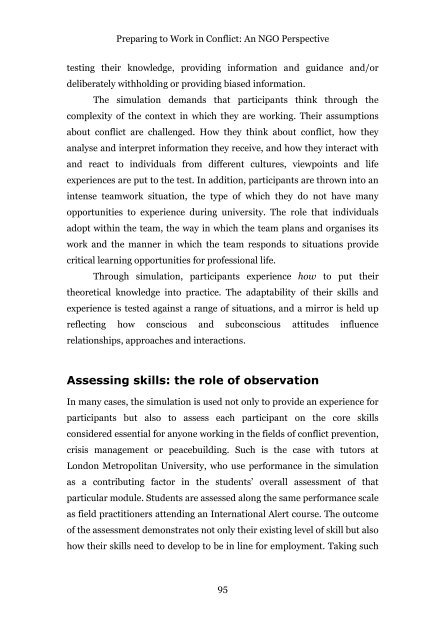The Scholarship of Engagement for Politics: - Higher Education ...
The Scholarship of Engagement for Politics: - Higher Education ...
The Scholarship of Engagement for Politics: - Higher Education ...
You also want an ePaper? Increase the reach of your titles
YUMPU automatically turns print PDFs into web optimized ePapers that Google loves.
Preparing to Work in Conflict: An NGO Perspective<br />
testing their knowledge, providing in<strong>for</strong>mation and guidance and/or<br />
deliberately withholding or providing biased in<strong>for</strong>mation.<br />
<strong>The</strong> simulation demands that participants think through the<br />
complexity <strong>of</strong> the context in which they are working. <strong>The</strong>ir assumptions<br />
about conflict are challenged. How they think about conflict, how they<br />
analyse and interpret in<strong>for</strong>mation they receive, and how they interact with<br />
and react to individuals from different cultures, viewpoints and life<br />
experiences are put to the test. In addition, participants are thrown into an<br />
intense teamwork situation, the type <strong>of</strong> which they do not have many<br />
opportunities to experience during university. <strong>The</strong> role that individuals<br />
adopt within the team, the way in which the team plans and organises its<br />
work and the manner in which the team responds to situations provide<br />
critical learning opportunities <strong>for</strong> pr<strong>of</strong>essional life.<br />
Through simulation, participants experience how to put their<br />
theoretical knowledge into practice. <strong>The</strong> adaptability <strong>of</strong> their skills and<br />
experience is tested against a range <strong>of</strong> situations, and a mirror is held up<br />
reflecting how conscious and subconscious attitudes influence<br />
relationships, approaches and interactions.<br />
Assessing skills: the role <strong>of</strong> observation<br />
In many cases, the simulation is used not only to provide an experience <strong>for</strong><br />
participants but also to assess each participant on the core skills<br />
considered essential <strong>for</strong> anyone working in the fields <strong>of</strong> conflict prevention,<br />
crisis management or peacebuilding. Such is the case with tutors at<br />
London Metropolitan University, who use per<strong>for</strong>mance in the simulation<br />
as a contributing factor in the students’ overall assessment <strong>of</strong> that<br />
particular module. Students are assessed along the same per<strong>for</strong>mance scale<br />
as field practitioners attending an International Alert course. <strong>The</strong> outcome<br />
<strong>of</strong> the assessment demonstrates not only their existing level <strong>of</strong> skill but also<br />
how their skills need to develop to be in line <strong>for</strong> employment. Taking such<br />
95
















